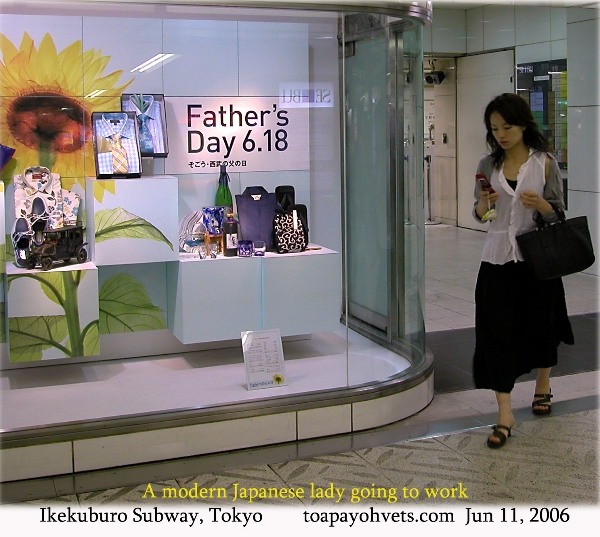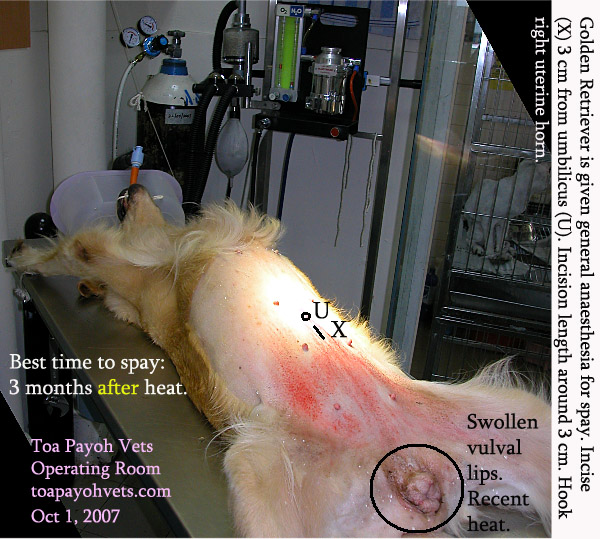DRAFT
I guess you do lots of writing in your present career. Are you a writer or in the mass communication business?
My replies to you are in CAPITAL LETTERS BELOW.
---...@singnet.com.sg> wrote:
> Dear Dr. Sing:
>
> Thank you so much for your kind advice on the
> situation, especially your taking time to answer my
> email before rushing to work this morning.
>
> Here are my thoughts on your very systematic pros &
> cons of whether or not to spay my dog.
>
> YES.
> > 1. Prevention of breast cancers and womb
> infections,
> > but not all intact female dogs get this problem.
> Only
> > that the probability is higher for intact females.
>
> I will ensure that my dog gets regular checkups at
> the vet. Only issue now is finding one vet/clinic
> we will stick to since my dog hasn't gone to the vet
> in so many years haha!
>
> > 2. Unwanted puppies/dogs being put to sleep or
> > abandoned. This does not apply to your situation.
>
>
> I will try every means possible to make sure my dog
> isn't accidentally mated. I would of course love to
> have her puppies, but I think she's too old to go
> through pregnancy at this age.
FEMALE DOGS OVER 6 YEARS OLD ARE ADVISED NOT TO BREED, GENERALLY.>
>
Are female dogs fertile only when they are on heat?YES.
>
Do they have urges and want to mate when they are
> not on heat? NO. SOME 'MATING' BEHAVIOUR SEEN COULD BE DUE TO DOMINANCE BEHAVIOUR.
if my dog gets humped by a male dog
> (whether or not she wants it) when she is not on
> heat, will she get pregnant? >
NO
> > 3. Dirtying the house with blood stains every 6
> > months. This problem does not bother you.
>
> Yes, I let my dog run about the house even when she
> is having her menses. Only thing is I wipe her
> before she sits down on her bed, but all these
> problems are solved with the sanitary pants.
> Amazing thing is one night she managed to get the
> pants off! This is the kind with a buckle strap and
> the pants/buckle were intact next to her bed the
> next morning haha! I didn't scold her or anything
> but kept the pants on and took them off only when
> she has her food or needs to relieve herself, so she
> learned very fast. She struggled when I tried to
> put on the pants at first, but later on, she would
> even stand still to let me strap on the pants!!
>
GOOD TEACHER. YOU MUST BE GIVING HER LOTS OF PRAISES AS REWARDS.
> > 4. Urine marking making the residence smell
> strongly
> > of urine. Very rare in female dogs. Your sounds
> like a
> >
submissive urination case and not an alpha female.
> > Does she pee when excited or greeting you?
>
> Oh she is the sweetest and gentlest dog. She doesnt
> even struggle when you try something new on her e.g.
> tying her hair. Last night she won over our
> long-time lady friend who has been terrified of dogs
> all her life, but our friend was so smitten was our
> dog that she took so many pictures together so that
> she can use it as her handphone wallpaper.
>
> My dog is very afraid of my husband because he uses
> a loud and disciplinary tone when he talks to her.
> Nowadays he isn't fierce to her anymore, but she is
> still a little scared of him, so she often pees when
> he is trying to pick her up to put her back in the
> balcony.
SUBMISSIVE URINATION. YOUR DOG WANTS TO APPEASE YOUR HUSBAND SO THAT SHE WILL NOT BE BITTEN (THIS IS WHAT SHE WILL DO IF SHE LIVES IN THE PACK OF DOGS. YOUR HUSBAND IS HER PACK LEADER. You may be the subordinate or at most an equal. )
No problems with me though ... I know she
> won't follow me when she knows I need to go to work,
> so we have to put her in the balcony, so I just pick
> her up and hold her all the way from upstairs to
> downstairs balcony, with lots of hugs and patting of
> course.
>
> Oh I must share with you this about her toilet
> training. We sleep in the upstairs bedroom and her
> urine area is downstairs in the balcony. When I
> wake up to go to work in the morning, I used to have
> to carry her from her bed, put her in the balcony,
> close the sliding doors, and make sure she has
> relieved herself before letting her out again.
> Nowadays she knows when I have got out of bed, but
> she stays in her bed. I go downstairs to do my
> stuff and soon enough I hear her running down the
> stairs, she usually comes to see where I am, and
> then either she runs herself to the balcony or I
> tell her verbally to go pee pee, she runs to
> balcony, pees, comes out, and waits for me to wipe
> her. Then she will wait for me to go back up
> together to the bedroom.
>
> There are times when the dog has run up herself to
> rest in her bed and wait there for me when we have
> guests at our place till very late at night.
SEEMS TO BE TOILET TRAINED. SHOULD BE AT 8 YEARS OR SOMETHING IS TERRIBLY WRONG.
>
> > 5. Skin disease affected by hormonal imbalance.
>
> I will monitor her skin condition. Not a problem
> since I was terrified of dogs all my life until I
> decided to take care of her, so I read up online
> about grooming dogs and so now I groom her myself
> and bathe her weekly.
I GUESS YOU WERE BITTEN/LEAPT UPON BY A DOG WHEN YOU WERE YOUNG.
>
> > 6. False pregnancy. Dog gets moody, aggressive,
> not
> > eating and other behaviour.
>
> I didn't sense any change in her temperament during
> her recent heat. Only thing was more frequent
> urination and she even wet the pad in the sanitary
> pants without bothering to go to her urine tray.
HOW TO GO TO THE PEE TRAY WHEN SHE CANNOT PEE ONTO IT? SHE HAS A PAD, REMEMBER? > But she didn't like feeling the wetness in the pants
> after she did that, after a few times, she learned.
CAN'T FIGURE OUT WHAT YOU ARE WRITING ABOUT. YOU MEAN SHE CAN STILL PEE ON THE PEE TRAY WITH PADS ON?>
> For her, the motivation is what she needs to do in
> order to be let out to be with us, so she tries her
> best to learn the behaviour expected of her ...
>
> > NO.
> > 1. Breast cancer and infection of the womb can be
> > detected if you take the trouble every week to
> check
> > your dog and get her examined by your vet 6
> monthly
> > during the senior years.
>
> OK I will make sure my dog gets regular checkups.
OBSERVE FOR CHANGE OF BLOOD COLOUR AND CONSISTENTCY. USUALLY BAD VAGINAL DISCHARGE IS YELLOWISH, STARCHY AND SMELLY IN PYOMETRA (WOMB INFECTION). >
> > Or at least yearly. As puppies, there is plenty of
> > attention. As older dogs, many owners just forget
> > about them, esp. their dental infections and other
> > problems.
>
> My dog does have bad breath. I heard that most older
> dogs have bad breath. I am just starting to get her
> used to brushing teeth, but it's not easy training
> such an old dog ha ha! Other than toothpaste, are
> the dental water products (those that you add to
> their water) any help in preventing bad breath?
YOUR DOG NEEDS DENTAL SCALING AND CHECK UP BY YOUR VET. I wonder how people in the past managed this when they
> didn't have the habit of brushing their dogs' teeth,
> yet the dog lived till old age ...
>
> > NO TIME FOR YOUR DOG - PYOMETERA (womb infection)
> in
> > older female dogs.
>
> This is my main concern that made me think seriously
> about whether or not to spay my dog.
>
> However I believe I can decide now that you've
> kindly laid out the pros and cons for me. I don't
> think I'll spay my dog, but I'll be extra diligent
> in monitoring her condition.
>
> There are a few more questions I would like to check
> with you though:
>
> 1) My dog tears often and has dried-up eye shit
> along her fur from the eyes all the way down to
> almost the nose.
>
> Is tearing common?
YES, IN SOME BREEDS LIKE THE POODLES AND MALTESE.>
> 2) She also pants a lot sometimes. If at home, she
> tends to want to sit on the floor under the fan. So
> I guess she pants at those times because she's hot.
> However, there are times when I hold her in the
> front passenger seat and she snuggles up to me, the
> aircon is on but we can hear her panting. Why would
> that be since the aircon is on and she shouldn't be
> hot? She didn't seem distressed or anything. And
> after a while she would seem to be ok.
ANXIETY PROBABLY
>
> 3) Separation Anxiety
>
> My dog follows me around the house but doesn't
> disturb me when I'm home. When we take naps or
> sleep at night, she has her own bed on the floor in
> our bedroom. Again she doesn't disturb us, but just
> wants to be around us (me). The thing is we have to
> leave her alone during the day when we are working,
> so she is often alone in the balcony behind the
> closed sliding glass doors for 8 hours or so until I
> come home in the evenings. She senses we have
> returned even from the time we come out of the
> carpark which is right in front of our block and
> starts barking continuously when we are coming up
> the steps. The barking usually stops when we enter
> our flat and then my husband scolds her for being
> noisy.
>
> However, there are times when I come home alone and
> she doesn't bark at all until I have entered the
> house, and even then it is just a few barks, not
> continuous
=== message truncated ===
I GUESS THE EMAIL IS TOO LONG. YAHOO.COM HAS TRUNCATED IT.
























